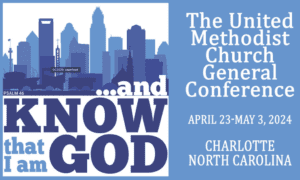Dear church family, I am writing to you to report on the work of the General Conference of the United Methodist Church (UMC) in Charlotte, North Carolina. I had the honor and joy of participating as a reserve delegate of our North Texas Annual Conference. One of my most impactful experiences was making new friends from the Philippines and various African countries, which made me realize I need to learn French for the next round if I continue to serve as a delegate. (Are there any French speakers among us who could help me with this?) Also, sharing the table and meaningful conversations with our United Methodist siblings from other parts of the world expanded my perspective of the church’s global mission by broadening my understanding of the diversity and unity within the UMC.
Now, you may be wondering what the General Conference is. The General Conference is the denomination’s highest legislative body, responsible for making policy and setting the direction of the church globally. Comprised of delegates from various regions worldwide, the General Conference meets every four years to review and vote on proposed legislation, amend church laws, adopt resolutions on current moral, social, public policy, and economic issues, and approve plans and budgets for church-wide programs.
Regionalization Petitions Approved
Some major petitions approved by the General Conference this year include the Regionalization petition. This significant regionalization initiative aimed at restructuring the denomination to better align with the diverse contexts of the church’s global regions. Bishop Tracy S. Malone highlighted that this move would allow the church to tailor its ministries locally while maintaining a unified mission and essential faith principles. This strategy involves transforming current central and U.S. conferences into regional ones with equal legislative powers to enhance missional impact. The proposed constitutional amendment necessary for this restructuring requires a two-thirds majority from worldwide annual conferences to pass. However, while the delegates at the General Conference approved it, each Annual Conference has to vote on the petition within the next 18 months, and the total aggregate vote of all Annual Conferences worldwide must be a two-thirds majority too to be adopted.
Removal of Restrictive Language Related to LGBTQ People
Other major petitions that were approved were those related to the elimination of discriminatory language and practices against LGBTQ individuals within the Book of Discipline. With overwhelming support, the conference voted to remove clauses stating that homosexuality is incompatible with Christian teaching, bans on the ordination and appointment of “self-avowed practicing” homosexual clergy, and prohibitions on conducting same-sex weddings. While the new measures do not compel congregations to accept gay pastors or host same-sex weddings—preserving individual clergy and congregations’ rights to decide—these changes aim to eliminate specific biases in church legislation while respecting diverse opinions within the church. These changes bring the Book of Discipline back to a neutral place (before 1972) where one group is not singled out for discrimination. It holds space for differing opinions within The United Methodist Church by avoiding broad mandates.
For further details and more information regarding other passed legislation, I have attached a document summarizing the major petitions and changes approved by the General Conference to this email. Additionally, if there is a need, I may plan a Q&A session in the near future.
In conclusion, in the words of our Bishop Rubem Saenz, Jr. “The most important things have not and will not change. Every United Methodist Church will welcome whomsoever seeks to know Christ and grow in love for God and neighbor. Our communion table and our hearts, minds and doors are open.”
Pastor Edgar.
You can view the full General Conference Recap HERE.


